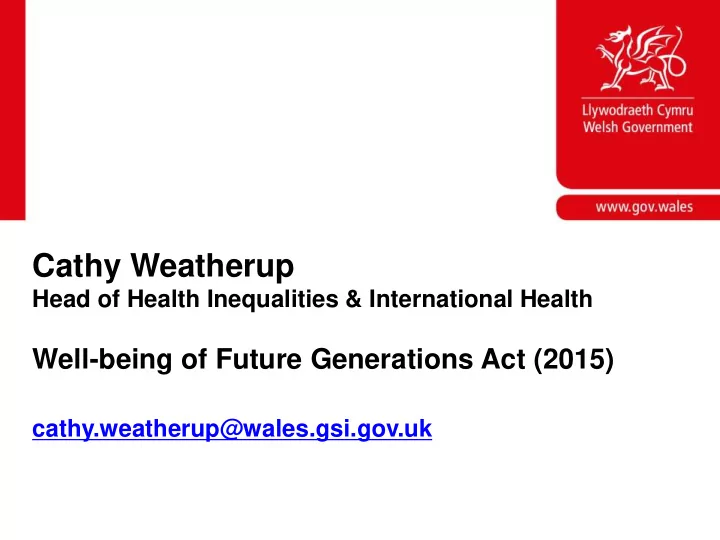

Cathy Weatherup Head of Health Inequalities & International Health Well-being of Future Generations Act (2015) cathy.weatherup@wales.gsi.gov.uk
Population and health
A globally responsible Wales
CONVERSATIONS WITH SCHOOLS
CONVERSATIONS WITH YOUTH GROUPS AND COLLEGES
A CONVERSATION WITH COMMUNITIES – PLACE BASED AND ONLINE
EMERGING MESSAGES
Well-being duty Each public body must carry out sustainable development Set objectives Take steps to meet objectives
Ways of working
Well-being of Future Generations (Wales) Act - Architecture A Wales of A Wales of A globally A prosperous WELL-BEING GOALS A more equal A resilient A healthier vibrant culture cohesive responsible Wales Wales A sustainable Wales Wales Wales and thriving communities Wales Welsh language PROGRESS National Indicators and Milestones Duty: Each public body must carry out sustainable development WHO Local well-being plan Public Service Organisations: Assessment of Local Well-being Natural Welsh National Arts Sports National Velindre Public Health National Park Fire & Rescue Local Local Health Community HEFCW Resources NHS Trust Councils Government Museum Council Wales Library Wales Authorities Authority Authorities Boards Wales Public Services Boards Other partners HOW Sustainable Development Principle Long-term Prevention Collaboration Involvement Integration TRENDS Future Trends Report TRANSPARENCY Better information Annual reporting Responding to the Commissioner Statement EXAMINATIONS Auditor General for Wales Examinations SUPPORTING THE CHANGE Future Generations Future Generations Commissioner for Wales Advisory Panel Long term Advice Review powers Recommendations Monitor Report
Future Generations Commissioner Sophie Howe
Accountability
The frame for assessing well-being has fundamentally changed in focus and scale A public services board must prepare and publish What the Act and guidance an assessment of the state of economic, social, specifically tell us about well-being environmental and cultural well-being in its area a assessments and plans – year before it publishes its local well-being plan Key points: • focus on the ‘state’ not need • qualitative explanation of causes, objectives and outcomes • future focus • accountability and scrutiny of assessments and plans • areas larger than wards • includes other Assessments: Population; Climate Risk
Implementation Generational New Clarity through Contribution Challenges Opportunities Goals Shared A prosperous Climate change Low carbon Wales Public economy Skills A resilient Wales Private Healthy A healthier Wales Employment ecosystems Third Sector A more equal Poverty Connected Wales People and communities Communities A Wales of Inequalities cohesive People reaching communities Biodiversity their potential decline A Wales of thriving Equality culture and Welsh Environmental language Limits A globally responsible Wales
The principles of good governance • Legitimacy and voice : that all stakeholders be included in a legitimate process of development • Direction : that a clear vision is set • Performance : that a measurable process and outcomes are set • Accountability : that all relevant sectors are accountable for shared goals • Fairness : that the governance systems proposed involve equitable processes backed by legislation Source: Graham, Amos and Plumptre, Principles for good governance in the 21 st century
Intended effect A Welsh society’s commitment to a better quality of life for future generations Shared aim – improving the economic, social, environmental and cultural well-being of Wales Stronger governance for the long term Better decision making focusing on outcomes
National Indicators & Milestones Is Wales becoming more sustainable? Annual Report
International “What Wales is doing today the world will do tomorrow” Nikil Seth, Direct or Sustainable Development, United Nations (30 April 2015)
Diolch yn fawr Thank you very much cathy.weatherup@wales.gsi.gov.uk www.gov.wales
Recommend
More recommend